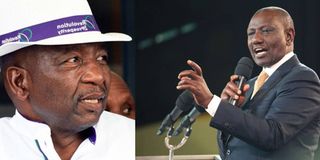From Ruto to Matekane: Is this ‘new’ breed of African leaders?

Lesotho Revolution for Prosperity party (RFP) leader Sam Matekane and President William Ruto.
What you need to know:
- In several countries, voters seem to fall in love with wealthy candidates with a message of economic salvation for the downtrodden.
- That is if you are running for the presidency in southern Africa, lower West Africa and coastal East Africa.
- Rich presidents are flourishing in West Africa too.
Last week there was an election in Lesotho, the mountain kingdom in Southern Africa that had a lot of snow in August.
Mr Sam Matekane’s pro-business Revolution for Prosperity (RFP) party won the most seats, 56, in Parliament, just five short of an absolute majority.
He has cobbled together a coalition with two smaller parties to form a government.
Matekane’s victory surprised many. The newbie politician had formed the RFP only six months earlier. It was also intriguing.
Matekane is a diamond millionaire. It seems a good time to be a rich candidate in Africa.
In several countries, voters seem to fall in love with wealthy candidates with a message of economic salvation for the downtrodden.
That is if you are running for the presidency in southern Africa, lower West Africa and coastal East Africa.
Kenya’s new president, Dr William Ruto, who ran on a “hustler” platform, promising to deliver bottom-up economic fortunes, probably sits comfortably on the list of Kenya’s 100 wealthiest people.
His rival, Mr Raila Odinga, had the winds favoured him, would also have been up there.
In August last year, Hakainde Hichilema became Zambia’s seventh president.
A year later, Zambians and money people worldwide are still swooning over him as he continues to make all the right moves and noises about salvaging the debt-ravaged economy.
Though in politics longer than Matekane, Hichilema had contested five times before—in 2006, 2008, 2011, 2015 and 2016.
He is also a businessman and one of Zambia’s wealthiest people, worth nearly $400 million (Sh40 billion).
He owns one of the biggest cattle ranches in Zambia and has shares in many companies—including Zambezi Sun, Pick N Pay, Game Stores, Mukuba Mall and Manda Hill Centre. Mild-mannered and not given to ostentation, he came across as believable.
Zambia’s neighbour to the east, Malawi, in 2020 also got a new president in the person of Lazarus Chakwera.
A prayerful politician like President Ruto, he is not a poor man. When he came to office, his network was estimated in the range of $1.5 million.
Pulling in way above Chakwera and Hichilema is President Cyril Ramaphosa. He came to office in 2018 as one of South Africa’s richest men—a mean feat since the country has many of the wealthiest people on the continent.
With vast business interests, and a rancher like Hichilema, his net worth is over $450 million.
Rich presidents
Rich presidents are flourishing in West Africa too. If Ghana’s President Nana Akufo-Addo were Kenyan, he would have been dubbed “ultimate dynasty”. He comes from ‘old money’ and political pedigree.
His father, Edward Akufo-Addo, was Ghana’s third Chief Justice from 1966 to 1970, chairman of the 1967-1968 Constitutional Commission and the non-executive president of Ghana (1970-1972). Akufo-Addo’s fortune is estimated at $250-350 million. Like Lesotho’s new man Matekane, he is unashamedly pro-business.
The most spectacular scenario, however, is unfolding in Nigeria, where they tend to do things bigger than anywhere else.
Earlier in the year, one of the two leading parties, the Peoples’ Democratic Party, picked Atiku Abubakar as its presidential candidate for the 2023 general election.
The All Progressives Congress’s ruling party tapped Bola Tinubu for the 2023 contest.
Should Atiku win, Nigeria will have a president worth $2.1 billion. If Tinubu takes it, they will have a leader worth $4-32.7 billion, depending on who is counting.
The picture couldn’t be more different when we get into upper West Africa and the Sahel strip.
There, the new saviours come bearing guns and bullets. At the end of September, Burkina Faso had its second coup of the year.
At the end of September 2020 in Guinea, the young and charismatic—but no less menacing—Col Mamady Doumbouya seized power in a coup.
Mali had a coup in 2020 and last year. They are probably waiting on the 2022 upgrade. In Niger, they had a go at a coup in March last year and flopped.
In its diversity, Africa is offering different and diametrically opposed political tendencies among voters and paths to the apex of power.
One of the guns was around before; so, it’s familiar. The one of wealthy politicians bearing gifts is relatively new and would have been almost impossible to predict in the revolutionary, radical and anti-rich politician wave that swept the continent for most of the past 35 years.
We have come a long way. The African voter still wants some of the old things—populists, political messiahs and good men and women to lead them.
The change, as Paul Simon sang it, is that they like them better if they have diamonds on the soles of their shoes—and are clutching a Bible as a bonus.
Mr Onyango-Obbo is a journalist, writer, and curator of the “Wall of Great Africans”. @cobbo





